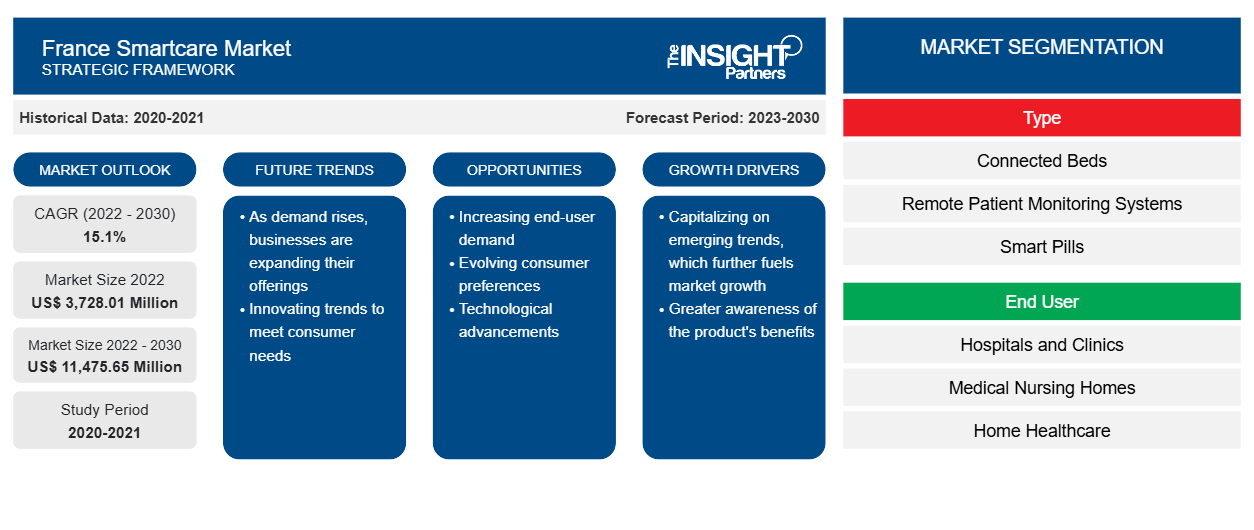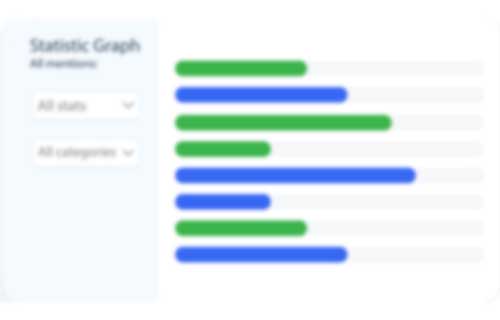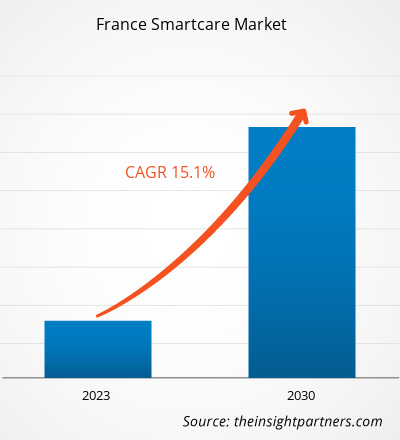The France smartcare market size is projected to grow from US$ 3,728.01 million in 2022 to US$ 11,475.65 million by 2030; it is estimated to record a CAGR of 15.1% during 2022–2030.
Market Insights and Analyst View:
Smartcare is the embodiment of smart systems to improve patient flow and patient care in healthcare institutions through intelligent interchange of data. In smartcare, the patient data is immediately forwarded from one department to another or from one facility to another, depending on where the patient is scheduled to go next. Remote patient monitoring (RPM), electronic health record (EHR), and radiofrequency identification (RFID) systems used in healthcare settings are among the technologies used in smartcare. Use of artificial intelligence (AI), internet of things (IoT), 5G technology, and technologically advanced products fuels the France smartcare market growth.
Growth Drivers and Restraints:
The competence to collect, manage, and use data from medical devices has become complicated owing to the increasing number of medical devices used in patient care. Medical device connectivity is referred to as a linking of medical devices to electronic medical records (EMRs) or electronic health records (EHRs) to facilitate data exchange. An EHR is a digital representation of a paper chart of patient. EHRs are real-time and patient-centered records that yield information available securely and instantly to authorized users. An EHR system is designed to exceed standard clinical data collected in a provider's office. It provides a more comprehensive view of a patient's care. Integrating medical device and equipment data with EMR systems and clinical solutions is critical to modern healthcare. Initially, when the concept of EMR was introduced, the hospital staff had to manually store and check the data from the medical device, which was time consuming. With the use of medical device connectivity, the data is transferred directly from a medical device to the EHR/EMR software, reducing the time from ~4 minutes to 20 seconds. Also, the integration is crucial to provide a comprehensive and up-to-date view of a patient’s health information, enabling providers to make informed decisions and deliver better patient care quickly. It also reduces the healthcare costs. With the rise of wearable and portable medical devices and new medical equipment, healthcare providers increasingly integrate vast amounts of data into their EMR systems.
The high adoption of EMR solutions and growing emphasis of governments across France on building nationwide healthcare information exchanges propel the demand for efficient smartcare solutions. Thus, the growing use of EHR/EMR and medical device connectivity fuels the growth of the France smartcare market.
Telehealth bridges the gap between patients, and physicians and health systems by enabling patients to communicate with physicians through virtual channels remotely. It helps reduce unnecessary visits to hospitals for minor issues. When paired with telehealth services, wearable technology can help care providers study real-time patient data to generate intelligent individualized insights and curate the best treatment plan from the comfort and safety of their homes. Due to the COVID-19 outbreak, there is an increase in the use of telehealth services and wearable technologies that are tagged through medical device connectivity. After the outbreak, virtual consultations are fully reimbursed by the French Social Security. Remote patient monitoring (RPM) is a telehealth program that collects and analyzes patient health or medical data. It has expanded in the past decade and has improved medical outcomes and treatment of noncommunicable chronic diseases. However, implementation of RPM into routine clinical activities has been limited. The Ministry of Health in France introduced a temporary funding program named as ETAPES in 2014. Through this program, healthcare providers and RPM solution providers for diabetes, chronic heart failure, chronic renal failure, chronic respiratory failure, and therapeutic implantable cardiac prosthesis are temporarily being funded. Moreover, the program is a prefiguration for integrating the RPM funding model for routine clinical activities into a model. It was extended till 2022 to encourage the use of innovative technologies in addition to exploring the advantages telemedicine could bring to the French health system. The growing focus of French Government on reimbursement for telehealth and RPM creates awareness about the use of smartcare devices in the healthcare system. Thus, the availability of favorable reimbursement scenario fuels the growth of the France smartcare market.
According to an article published by Business News Daily, an average hospital room contains 15–20 connected medical devices. In a few hospitals, connected medical devices outnumber mobile devices, such as laptops and smartphones, by four to one. Nearly 85,000 connected devices are housed in a large hospital, with each device performing significant roles in delivering care while ensuring operational efficiency. These connected devices are vulnerable to malicious cyberattacks. Therefore, the number of data breaches associated with healthcare information and patient data has been gradually increasing. Healthcare is second only to the finance industry in the number of cyberattacks annually. Recent cyberattacks have shifted the issue of cybersecurity and data risk management centers in front. In December 2022, a hospital in Versailles canceled operations and had to transfer some patients to other hospitals for emergency surgeries due to a cyberattack. Similarly, in August 2022, the Corbeil-Essonnes hospital was also targeted by a cyberattack. Thus, digital healthcare is a lucrative target for cyberattacks and data breaches, with misconfigured cloud storage buckets, weaponized ransomware, and phishing e-mails, which, in turn, restrains the adoption of smartcare.
Customize This Report To Suit Your Requirement
You will get customization on any report - free of charge - including parts of this report, or country-level analysis, Excel Data pack, as well as avail great offers and discounts for start-ups & universities
France Smartcare Market: Strategic Insights

- Get Top Key Market Trends of this report.This FREE sample will include data analysis, ranging from market trends to estimates and forecasts.
Customize This Report To Suit Your Requirement
You will get customization on any report - free of charge - including parts of this report, or country-level analysis, Excel Data pack, as well as avail great offers and discounts for start-ups & universities
France Smartcare Market: Strategic Insights

- Get Top Key Market Trends of this report.This FREE sample will include data analysis, ranging from market trends to estimates and forecasts.
Report Segmentation and Scope:
The "France Smartcare Market" is segmented on the basis of type and end user. The smartcare market, by type, is segmented into connected beds, remote patient monitoring, smart pills, smart syringes, RFID systems, electronic health records, and others. The smartcare market, by end user, is segmented into hospitals and clinics, medical nursing homes, home healthcare, and others.
- This FREE sample will include data analysis, ranging from market trends to estimates and forecasts.
Segmental Analysis:
The smartcare market, by type, is segmented into connected beds, remote patient monitoring (RPM), smart pills, smart syringes, RFID systems, electronic health records (EHR), and others. The remote patient monitoring segment held the largest market share in 2022, whereas the electronic health records segment is anticipated to register the highest CAGR of 16.0% during the forecast period. Remote Patient Monitoring (RPM) technology is used to collect patient’s medical information from health monitoring and diagnostic devices from patient’s location and then transfer it to the physician or doctor at another location. RPM remotely supervises and analyzes physiological parameters such as pulse rate, heart rate, blood oxygen levels, blood sugar, blood pressure, and vital signs. This helps reduce the patient hospitalization time and reduces hospital visits, which further improves patient's care and quality of life. Remote Monitoring devices development puts the future balance of public finances, especially healthcare, in jeopardy. TELEHPAD is an initiative that aims to make healthcare more accessible in rural regions. Patients, including both nursing home residents and the general local population, access teleconsultations as rooms in the nursing homes are directly connected to general and psychiatric hospitals. Thus, they can benefit from teleconsultations in geriatric medicine, psychiatry, dermatology, cardiology, and neurology. TELEFIGAR is another program aimed at offering nursing home residents the option of teleconsultations with experts in geriatrics, neurology, dermatology, and endocrinology.
Electronic Health Records (EHRs) or Electric Medical Records (EMRs) are patient-centered and real-time digital records that enable patient data to be readily available to authorized healthcare professionals. It contains patient's medical history, medications, allergies, treatment plans, diagnoses, immunization dates, radiology images, and laboratory test results. The national digital health agency (ANS) was formed in December 2019 to operationalize the government’s e-health strategy. Dossier Medical Partagé (DMP) is a fully interoperable EMR for all French citizens who are covered by health insurance. The nationwide DMP was launched in 2019. It is a free, secure, and confidential health record that stores patient’s information in one centralized, digital location. Increasing initiatives by French Government to introduce EHRs in their healthcare system boost the France smartcare market growth for the electronic health records segment.
In healthcare, Radio Frequency Identification (RFID) systems are used for patient, equipment, medicine, and pharmaceutical tracking and health records maintenance. RFID tags can be attached to patients' wristbands or belongings to track their location and status. It helps prevent patient abductions and improve patient care. The tags can be attached to medication bottles to track their inventory and ensure patients receive the correct medications. It prevents medication errors, which can be harmful to patients. Tracking equipment, machines, and vehicles are critical for hospitals as it informs hospitals of the location of their equipment, vehicles, and so on and assists in asset maintenance. RFID tags can also be used to track assets as they move within and outside the hospital.
France Smartcare Market, by Type – 2022 and 2030


- This FREE sample will include data analysis, ranging from market trends to estimates and forecasts.
The smartcare market, by end user, is segmented into hospitals and clinics, medical nursing homes, home healthcare, and others. The hospitals and clinics segment held the largest market share in 2022, whereas the home healthcare segment is anticipated to register the highest CAGR of 15.8% during the forecast period.
Country Analysis:
France has long been recognized for its excellence in healthcare, with renowned medical institutions, cutting-edge research, and highly skilled healthcare professionals. According to the World Health Organization (WHO), France ranks sixth globally in terms of investments (public and private) in healthcare. The government of France is focusing on introducing technologically advanced products in its healthcare facilities to become a global healthcare innovation leader in the future. The Health Innovation 2030 plan was launched by the government of France in 2021. As a part of this plan, the government invested US$ 693.46 million (€ 650 million) to accelerate the digital health strategy in the country. Thus, the increasing focus of government on digital health initiatives drives the smartcare market growth in France.
Rising product launches of smart wearable devices that can be used for health monitoring by the population and growing use of telehealth and telemedicine applications for consultations boost the growth of the France smartcare market. Furthermore, increasing use of EHR and RPM technologies by healthcare institutions such as hospitals, nursing homes, and clinics for monitoring and managing their patient flow to improve the quality of care and working efficiency of the institution in France also bolsters the smartcare market growth.
Competitive Landscape and Key Companies:
Oracle Corp, Samsung Healthcare, BodyCap, GE Healthcare Technologies, Orme SARL, AdolfWurth GmbH & Co KG, McKesson Corp, Kaspard, Domalys SAS, Siemens Healthineers, MintT, and Groupe WINNCARE SAS are among the largest smartcare companies. These companies focus on new technologies, advancements in existing products, and geographic expansions to meet the growing consumer demand worldwide.
France Smartcare Report Scope
| Report Attribute | Details |
|---|---|
| Market size in 2022 | US$ 3,728.01 Million |
| Market Size by 2030 | US$ 11,475.65 Million |
| Global CAGR (2022 - 2030) | 15.1% |
| Historical Data | 2020-2021 |
| Forecast period | 2023-2030 |
| Segments Covered |
By Type
|
| Regions and Countries Covered | France
|
| Market leaders and key company profiles |
- Historical Analysis (2 Years), Base Year, Forecast (7 Years) with CAGR
- PEST and SWOT Analysis
- Market Size Value / Volume - Global, Regional, Country
- Industry and Competitive Landscape
- Excel Dataset



Report Coverage
Revenue forecast, Company Analysis, Industry landscape, Growth factors, and Trends

Segment Covered
Type, and End User

Regional Scope
North America, Europe, Asia Pacific, Middle East & Africa, South & Central America

Country Scope
This text is related
to country scope.
Frequently Asked Questions
Smartcare is the embodiment of smart systems to improve patient flow and patient care in healthcare institutions through intelligent interchange of data. In smartcare, the patient data is immediately forwarded from one department to another or from one facility to another, depending on where the patient is scheduled to go next. Remote patient monitoring (RPM), electronic health record (EHR), and radiofrequency identification (RFID) systems used in healthcare settings are among the technologies used in smartcare.
The growth of the US smartcare market is attributed to a few key factors, such as growing penetration of EHR or EMR and medical device connectivity and favorable reimbursement scenario.
The smartcare market majorly consists of the players such as Oracle Corp, Samsung Healthcare, BodyCap, GE Healthcare Technologies, Orme SARL, AdolfWurth GmbH & Co KG, McKesson Corp, Kaspard, Domalys SAS, Siemens Healthineers, MintT, and Groupe WINNCARE SAS
Trends and growth analysis reports related to Technology, Media and Telecommunications : READ MORE..
The List of Companies - France Smartcare Market
- Oracle Corp
- Samsung Healthcare
- BodyCap
- GE Healthcare Technologies
- Orme SARL
- AdolfWurth GmbH & Co KG
- McKesson Corp
- Kaspard
- Domalys SAS
- Siemens Healthineers
- MintT
- Groupe WINNCARE SAS

 Get Free Sample For
Get Free Sample For